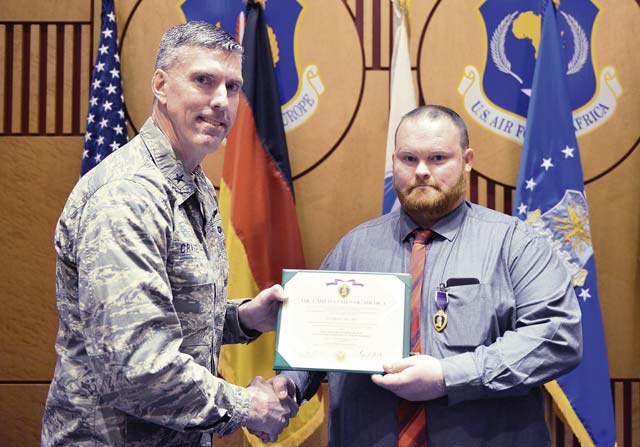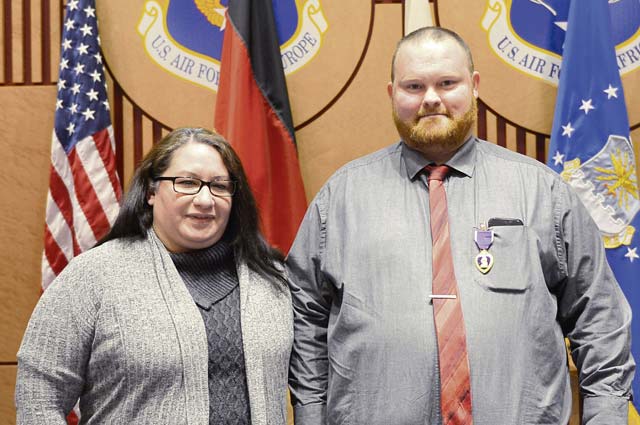
A communications engineer assigned to the U.S. Air Forces in Europe-Air Forces Africa video operations center received the Purple Heart Feb. 27 on Ramstein Air Base.
Judson Rackley, an Army veteran who now serves the Air Force as a contractor, awarded the decoration in front of his friends, family, and colleagues during a ceremony led by Brig. Gen. Christopher Craige, USAFE-AFAFRICA chief of staff.
Rackley was coy about receiving what he called his last decoration, and joked about it being one of the less desired honors.
“It’s been a long time coming, and it’s not really one that I want to get,” he said, laughing a little bit. “It puts the final seal on my service. It’s the last one, and now I’m a civilian moving on.”
He expressed gratefulness that he was able to receive the medal himself, and that it didn’t have to be accepted by a surviving relative.
The Purple Heart is awarded to military members and veterans for wounds received or death after being wounded in action against enemy forces.
Eight years ago when he was deployed to Afghanistan, Rackley was driving a vehicle during an escort mission when suddenly his team encountered a complex ambush. Rackley’s vehicle hit an improvised explosive device and the blast was so strong it disabled the vehicle and knocked the crew unconscious, he said.
“When I came to, all I could hear was the commander yelling into the headset asking if we were okay,” Rackley recalled. “When we reported that we thought we were okay but the vehicle was disabled, the commander began to move his truck up so his gunner could provide cover.”
Rackley also remembered getting shot at, then after a while being transferred by his teammates to a different vehicle.
The mission continued despite the attack, but Rackley and his team encountered more IEDs along the way. The group’s higher command ordered them to stop and wait for a route clearance team to come and escort them back, Rackley said.
Even while following the route clearance team, they still ended up hitting one more IED, he added.
The escort team eventually made it back to their forward operating base, where medical personnel met them.
Rackley described his journey to recovery as a long and difficult one. He received surgeries, rehabilitation, and counseling for his injuries.
Rackley gave a long list of people and agencies who helped him with his recovery. He highlighted the one he deemed most important to him: his wife Audrea. He cited Audrea as a source of inspiration, whether it was through positive encouragement or things he “didn’t want to hear.”
“She’s always there to give me what I need,” Rackley said. “She’s been there for 14 years and honestly she probably deserves this (award) more than I do.”
Rackley encouraged military members and veterans who suffered trauma from deployment to use the services available to them, such as the Veterans Affairs office, many private organizations, or their local hotlines.
The road to recovery should not be traveled alone, Rackley added.
“Ask for help,” he said. “The tools are there, just reach out.”



